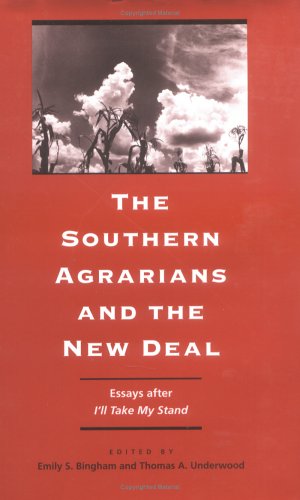The 1930’s were marked by intellectual trauma as well as by economic hardship. What had caused the apparent catastrophic crash of “capitalism”—collapse of equity, vanishing demand, and vast unemployment? The desire to diagnose the cause and prescribe a remedy created many ideas and movements. Some achieved success of a sort, and others went unheeded.
The latter category includes the Twelve Southerners of I’ll Take My Stand (and its inadequately appreciated sequel, Who Owns America?). Their prescription was the only one that looked back into the American tradition. The rest were intellectual constructions imported from Europe or made up for the occasion.
The Agrarians, like their English Distributist counterparts, believed that the malady was a surfeit of abstract ownership, government favoritism, dependence on oversized institutions, concentration of wealth, and artificial living. The remedy was a return to a better time of small but independent property owners—to what Mr. Jefferson had always said was the only true base for liberty, the widespread distribution of property—productive landed property, especially.
As Southerners, the Agrarians had no sympathy for “capitalism” as it had been practiced. Contrary to a common delusion, the ruling Republican Party has never represented free enterprise. What it represents is Big Business—private ownership with government subsidy, tariff protection, and manipulation of the money supply. Unlike mainstream American “intellectuals,” the Agrarians were never tempted by Marxism—it was a foreign import and only a more vicious form of consolidation of power. John Crowe Ransom wrote in “The South Is a Bulwark”: “Farmers are bad medicine for Marxians. But those in the South are obstructive small fry . . . which means that a good deal of work will have to be done with them.”
As Southerners, the Agrarians were at the same time more conservative and more populist than other Americans, something that middle-class intellectuals (like the editors of this book) will never understand.
The Southern Agrarians and the New Deal collects fugitive essays by several of the Twelve Southerners—Donald Davidson, Frank L. Owsley, Andrew Lytle, H.C. Nixon, and Allen Tate—on the crisis of the 1930’s. Contrary to the silly but commonplace charge that these writers were irrelevant purveyors of nostalgia, the essays reveal hard and original thinking. As long as the government was going to rearrange the economy, which was unavoidable, why should not its interventions lean in a Jeffersonian direction? Such ideas were put forward by Lytle (“The Small Farm Secures the State”); Davidson (“An Agrarian Looks at the New Deal”); Tate (“The Problem of the Unemployed—A Modest Proposal”); and the Ransom essay already quoted.
Of course, their ideas were not followed, which does not necessarily mean they were without merit. Their appeal has never died away. In fact, they have been cogently revived by Wendell Berry. The United States opted for agribusiness and the welfare-state capitalism that we have lived under since, with ever-increasing discontents. That was the domestic “solution”—from which is now proceeding apace the proletarianization of the working and middle classes. It was a long time before the country fully succumbed to the domestic regime’s inevitable companion—permanent revolution of the Trotskyite variety packaged as “global democracy,” whose conquest is only just now being completed as the revolutionary impulse weirdly combines in the muddled minds of our Chief Executive and his henchpersons with the old militant self-righteousness of the New England “city on a hill.”
As is common with published collections of sources these days, particularly Southern documents, the book has a 21-page Introduction with 79 footnotes, alerting us to every superficial and hostile commentator on the Agrarians who has ever published. We have hints and more than hints that the writers within were racists, tending toward fascism, disingenuous, and fatally flawed in their analyses. The editors are mortally afraid that someone might take the ideas of the Agrarians seriously. Racists? No more than anybody else in those days. Fascist? Their only connection with that was a Northern magazine editor from whom they quickly disassociated themselves. Disingenuous and fatally flawed? Compared to New Dealers and Marxists?
Let Davidson have a final word: Whatever the merits of their ideas, the Agrarians “have pointed out a road away from Leviathanism”: the road not taken.
[The Southern Agrarians and the New Deal: Essays After I’ll Take My Stand, edited by Emily S. Bingham and Thomas A. Underwood (Charlottesville: University Press of Virginia) 310 pp., $45.00]

Leave a Reply